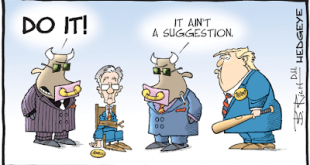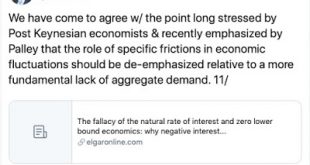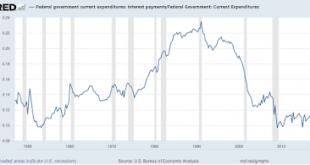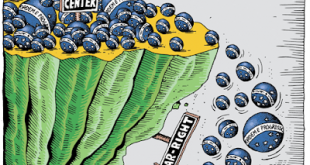By Thomas PalleyI could not get this op-ed (written November 6, 2019) published as it was a mix of too dull & didactic, and too partisan or not partisan enough. Anyway, in the wake of the election, I think it was analytically spot on so I have decided to post it. Also, it makes clear the very special circumstances of the UK election. It is a gross distortion to extrapolate from the UK to the US. Unfortunately, that is exactly what elite US media (e.g. New York Times) and neoliberal...
Read More »Central Bank Independence: A Rigged Debate Based on False Politics and Economics
No pressure! By Thomas Palley (guest blogger)The case for central bank independence is built on an intellectual two-step. Step one argues there is a problem of inflation prone government. Step two argues independence is the solution to that problem. This paper challenges that case and shows it is based on false politics and economics. The paper argues central bank independence is a product of neoliberal economics and aims to institutionalize neoliberal interests. As regards economics,...
Read More »Larry Summers on Effective Demand
On of the issues between more mainstream Keynesians and their more heterodox counterparts is whether frictions are central for Keynesian results or not. Since the Neoclassical Synthesis the conventional view is that some rigidity or friction was behind the problems of unemployment, be that the liquidity trap (the Keynesian case with the flat LM, since Hicks 1937), the rigidity of wages (since Modigliani 1944), or some other coordination problem (mostly in the New Keynesian literature).In...
Read More »Some unpleasant Keynesian arithmetic
By Thomas I. Palley (Guest Blogger)The last decade has witnessed a significant revival of belief in the efficacy of fiscal policy and mainstream economics is now reverting to the standard positions of mid-1970s Keynesianism. On the coattails of that revival, increased attention is being given to the doctrine of Modern Money Theory (MMT) which makes exaggerated claims about the economic costs and capability of money-financed fiscal policy. MMT proponents are now asserting society can enjoy a...
Read More »What’s Wrong With Modern Money Theory (MMT): A Critical Primer
By Thomas I. Palley (guest blogger)Recently, there has been a burst of interest in modern money theory (MMT). The essential claim of MMT is sovereign currency issuing governments do not need taxes or bonds to finance government spending and are financially unconstrained. MMT rests on a triad of arguments concerning: (i) the macroeconomics of money financed budget deficits, (ii) the employer of last resort or job guarantee program, and (iii) the history of money. This primer analyzes that...
Read More »Inequality and Stagnation by Policy Design
By Thomas Palley (guest blogger)This paper argues the mainstream economics profession is threatened by theories of the financial crisis and ensuing stagnation that attribute those events to the policies recommended and justified by the profession. Such theories are existentially threatening to the dominant point of view. Consequently, mainstream economists resist engaging them as doing so would legitimize those theories. That resistance has contributed to blocking the politics and policies...
Read More »Financialization and the low burden of public debt
Financialization is a fuzzy concept. There are many definitions, and none is clear cut, at least to characterize the changes of the last 40 years or so, which is the period most authors associate with financialization. I'm not suggesting it's not a useful concept though.* In some sense, financialization refers to the last phase in the capitalist system (even if there are ways in which one might argue that capitalism was always financialized). At any rate, going to the point I wanted...
Read More »Brazil is Falling Under an Evil Political Spell
By Thomas Palley (guest blogger)Brazil is falling under an evil political spell. The leading candidate in the presidential election is Jair Bolsonaro, an extreme right-wing politician. It is as if voters are sleepwalking their way to destruction of Brazilian democracy. Under the spell’s influence, they have become blind to the truth about Brazilian politics and blind to their better nature. Read rest here.
Read More »Job Guarantee Programs: Careful What You Wish For
Thomas Palley (guest blogger)Some progressive economists are now arguing for the idea of a Job Guarantee Program (JGP), and their advocacy has begun to gain political traction. For instance, in the US, Bernie Sanders and some other leading Democrats have recently signaled a willingness to embrace the idea. In a recent research paper I have examined the macroeconomics of such a program. Whereas a JGP would deliver real macroeconomic benefits, it also raises some significant troubling...
Read More »Modern Money Theory (MMT) vs. Structural Keynesianism
By Thomas PalleyA journalist sent me some questions about MMT. My answers are below. 1. What are the major flaws you see within Modern Monetary Theory? (A.) I like to say that MMT is a mix of “old” and “new” ideas. The old ideas are well known among Keynesian economists and are correct, but the new ideas are either misleading or wrong.The essential old idea, which everybody knows, is government has the power to issue money. We used to talk of “printing” money. In today’s electronic world we...
Read More » Heterodox
Heterodox




